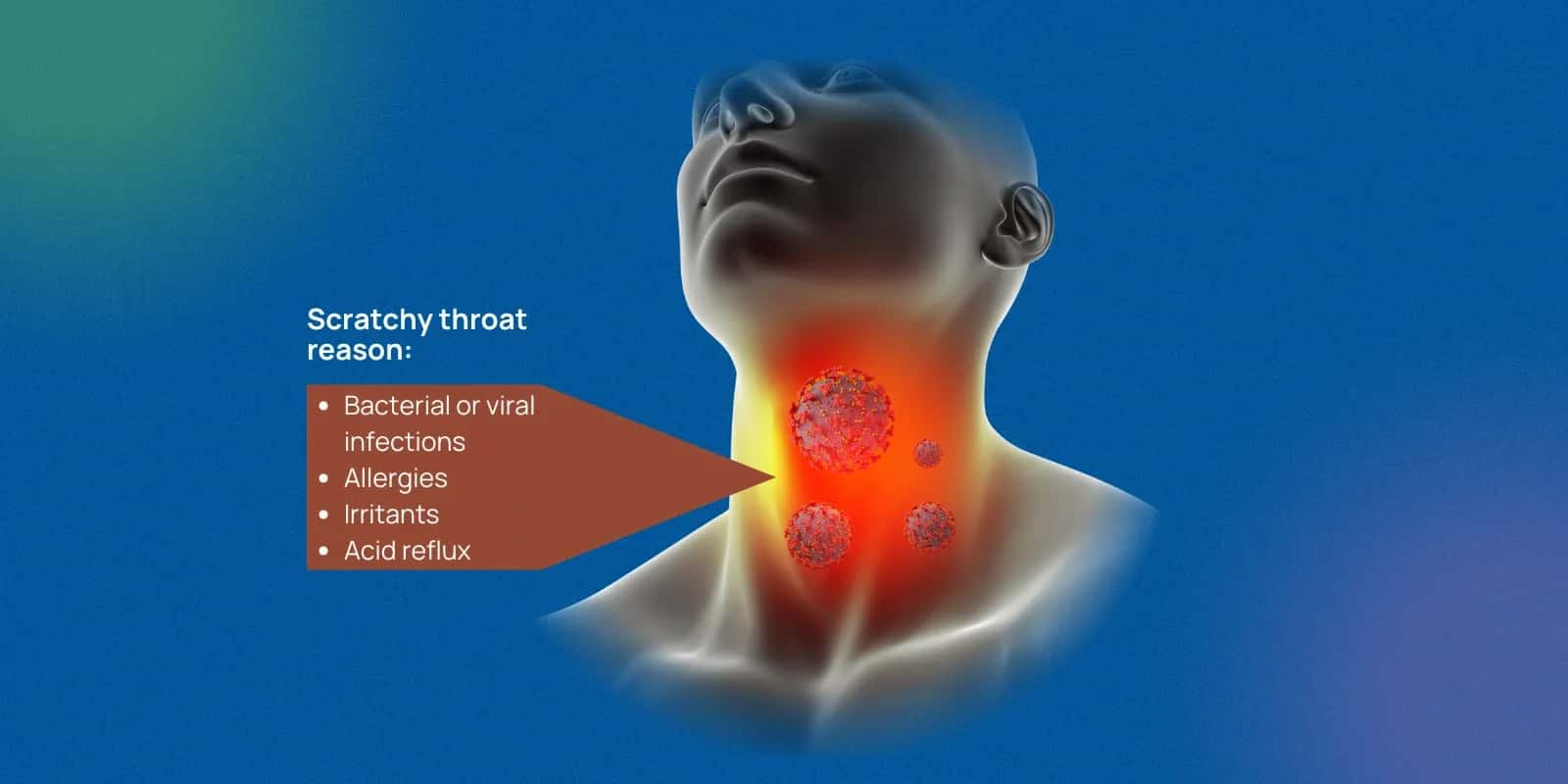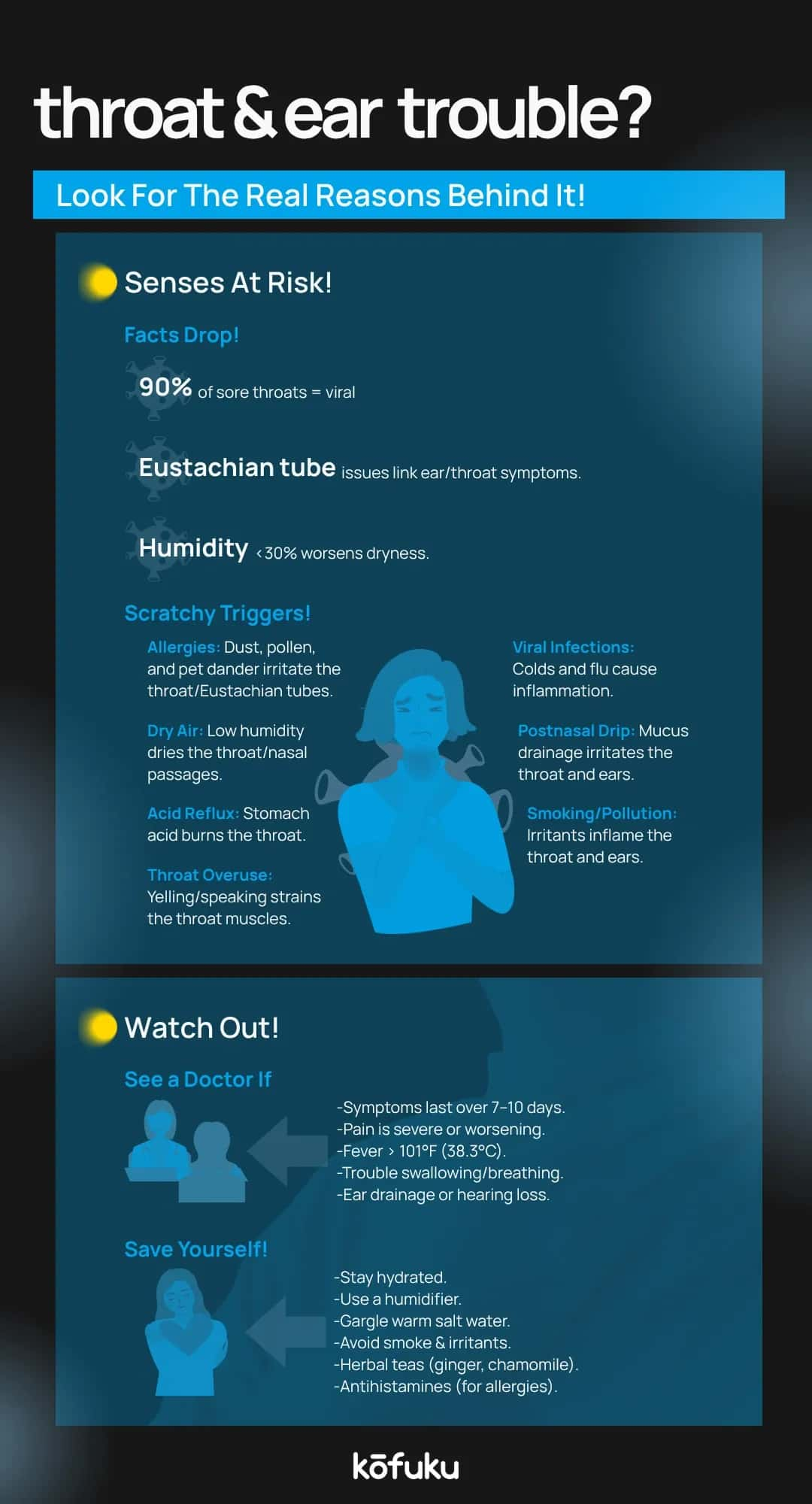Why Do My Throat and Ears Feel Scratchy? Causes and Solutions

Introduction
Have you ever felt that nagging itch in your throat and ears, and it just doesn’t stop? Well, you’re not alone! An itch can ruin your work, make swallowing a challenge, or keep you from a night of peaceful, uninterrupted sleep. This itch is generally not serious, and the possibility of a severe issue is less. Nonetheless, it is essential to pay attention to your body and address health concerns proactively.
Let's explore what causes itching in your throat and ears and how to get some relief from it.
What Triggers an Itchy Throat and Ear?
Your throat and ears share a nerve path, which is why irritants in one place often cause itchiness in the other. The common causes of an itchy throat and ears include:
A. Seasonal or Environmental Allergies:
Pollen, dust mites, cat dander, and other allergens can irritate the lining of your throat and ear canals, causing mild to severe allergies.
B. Viral or Bacterial Infections:
Viruses or bacteria, which cause colds, strep throat, sinus infections, or ear infections, can result in some itching or swelling, presenting with a sore throat and a low-grade fever.
C. Dry Air & Airborne Irritants:
Dry climates, heating, or air-conditioning can dry out your throat and ear canals, leading to constant dryness and itchiness.
D. Post-Nasal Drip:
When mucus in your sinuses is flushed down your throat, it can irritate the tissue, causing your throat to itch and your ears to feel tickly.
E. Acid Reflux:
When stomach acid makes its way up into the oesophagus, it can irritate your throat and the back of your nasal passages to the point of triggering coughing, hoarseness, and itchiness.
When Should You Be Concerned?
Most cases of these allergies are common and aren’t harmful, but here are some signs that warrant immediate medical consultation:
- If your allergy lasts longer than two weeks
- Pain while swallowing, trouble breathing, or a sore throat that just doesn’t go away
- Ear pain, pressure, drainage, or dizziness
- High fever, swollen lymph nodes, and any unexplained weight loss
If you experience these symptoms or if the itching in your throat and ears continues or worsens, you should consult a doctor immediately.
How to Soothe That Itch
Want immediate relief? Here’s how to deal with the cause of the itchiness:
Allergy Relief
-
Try using antihistamines, nasal steroid sprays, or decongestants after consulting your doctor and getting a prescription.
-
Keep your windows closed, get an air purifier, and wash your linens and clothes regularly.
-
When you come home from outside, shower or at least bathe and wash your hair to remove any traces of pollen or dust.
Infection Treatment
-
Most viral infections get cured within a week. Focus on getting plenty of rest and fluids, and use over-the-counter cough drops or any other meds that your doctor prescribes.
-
If the problems persist or worsen, consult your doctor and get tested if required.
Avoid Irritants
-
A humidifier can help you moisten the dry air in your house.
-
Drink warm fluids, such as decaffeinated hot tea and honey-lemon warm water.
-
Avoid smoking or vaping, and refrain from burning scented candles or exposing yourself to chemical fumes.

Post-Nasal Drip
-
A warm saline rinse or saline nasal spray can work wonders to clear out phlegm.
-
Steam and menthol rubs on your chest can help with sinus drainage.
-
If you’re experiencing post-nasal drip due to allergies, consider trying antihistamines or a steroid nasal spray.
GERD (Gastroesophageal Reflux Disease) Control
-
Eat smaller meals, and avoid spicy or fatty meals.
-
Don’t lie down right after eating.
-
Raise the head of your bed.
-
Avoid triggers like caffeine and citrus.
-
Try OTC antacids or acid blockers first.
-
If the reflux persists, discuss with your doctor.
Preventing Future Itch Episodes
Once you have tamed the itch, here are some ways to avoid any future flare-ups:
- Run a humidifier during dry months.
- Clean and replace the air conditioning filters monthly.
- Wash bedding weekly in hot water to get rid of any dust mites.
- Stay hydrated throughout the day to allow your body to absorb fluids effectively.
- Avoid irritants that can trigger flare-ups, such as cigarette smoke, perfume, or air pollution.
- If you are chronically affected by allergies, consider periodic immunotherapy (allergy shots) for relief and wear a mask whenever you step out.

Lifestyle Tips to Support Immune and Throat Health
- Enhance your immunity with foods loaded with vitamin C, zinc, and antioxidants.
- Exercise to improve circulation and respiratory health.
- Practice deep breathing and relaxation techniques, as stress sometimes contributes to prolonged inflammation.
- Maintain healthy oral hygiene practices, including gentle brushing, flossing, and the use of alcohol-free mouthwash, can help reduce irritation in your throat and ears.
A Soothing Daily Care Routine
Here’s a simple, quick care regimen to keep the sore throat and itchy ears at bay:
Morning: Start the day with a cool-mist humidifier.
During the day: Drink plenty of water or herbal tea; ginger-honey is also an excellent option to stay hydrated throughout the day.
Midday: Use a saline nasal spray and rinse your nasal passages to reduce mucus.
Evening: Take your allergy medicine and minimise exposure to screens and irritants before bed.
Night: If you have reflux, put your head slightly higher when going to sleep.
Final Thoughts
In conclusion, the annoying tickle in the throat or the itching sensation in the ears can often be caused by mild irritation due to allergies, dry air, or acid reflux. If the tickling or itching persists for more than two weeks or if you experience pain, fever, or difficulty swallowing, please contact your doctor immediately.
The solution for this issue is simple: hydrate, moisten the air, manage symptoms, and adjust your lifestyle habits. With time, that annoying tickle or itching feeling in your throat and ears will go away, freeing you of any allergies.

FAQs
Q. What are the most common causes of an itchy throat and ears?
A. The most common causes for an itchy throat and ears are allergies, infections, dryness, post-nasal drip, and acid reflux.
Q. Can allergies cause both an itchy throat and ears at the same time?
A. Yes, because allergens like pollen or dust can affect your throat and ear canals because of the nerves that run between them.
Q. When should I see a doctor for an itchy throat and ears?
A. You should see a doctor if your symptoms last longer than two weeks, continue to get worse, or if you have some sort of pain, fever, or difficulty swallowing.
Q. Are there any home remedies that provide quick relief?
A. Yes, humidifiers, warm teas, saline sprays, and other antihistamines can provide relief from these symptoms at home.
Q. How can I prevent future episodes of itchy throat and ears?
A. Stay hydrated, manage your allergies, and minimise or avoid irritants like smoke and dust. Additionally, use humidifiers while sleeping to soothe your throat.

Finger Twitching - Know the causes, signs, onsets and cures

10 Health Benefits of Apple Cider Vinegar You Should Know

10 Ways to Control Your Anxiety

10 Ways to Let Go of Regret

7 Quick Remedies for Indigestion


